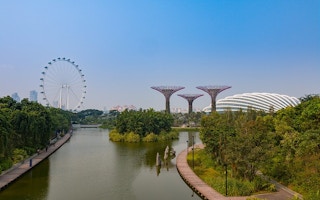For cities to build resilience, integrated solutions are required and this involves combining the knowledge of multiple stakeholders, whether they are governments, NGOs, private sector or community leaders, said Judith Rodin, president of The Rockefeller Foundation on Monday.
To continue reading, subscribe to Eco‑Business.
There's something for everyone. We offer a range of subscription plans.
- Access our stories and receive our Insights Weekly newsletter with the free EB Member plan.
- Unlock unlimited access to our content and archive with EB Circle.
- Publish your content with EB Premium.
Speaking at a plenary session at the World Cities Summit held in Singapore this week, Rodin shared how the most successful partnerships in building resilience are the ones where strategic goals are aligned among stakeholders.
The Foundation defines resilience as the capacity of individuals, communities, institutions, businesses and systems within a city to survive, adapt, and grow no matter what kinds of chronic stresses and acute shocks they experience.
She outlined three areas where collaboration plays a critical role in building resilience. They are: mobilising capital to build or rebuild infrastructure; collaborating with international finance organisations to unleash the power of capital markets; and creating scale to maximise impact.
Rodin noted that in the case of many cities, the most costly resilience investment is to build or rebuild infrastructure, for which cities are required to be credit worthy. Only 20 per cent of the 500 largest developing cities currently have that designation of credit worthiness.
To help address this problem, Rockefeller’s 100 resilient cities initiative provides cities with access to a platform of partners to solve their economic, social and physical challenges, said Rodin.
For example, the US-based non-profit partners with the World Bank to run worthiness workshops and trainings to help cities strengthen their financial performance and attract long term capital investments they need.
Apart from building resilience, cities also need to focus on energy transitions, said Charles O Holliday, chairman of oil giant Royal Dutch Shell, who also spoke at the plenary.
He noted that a successful global transition into a low-carbon energy landscape heavily depends on the global population pushing leaders to build on the Paris Agreement on tackling climate change and providing the public with alternative and better energy systems.
He mentioned that Shell will lead energy transitions - that is, shift towards renewable energy such as solar, wind and hydrogen - in collaboration with governments and private sector leaders.
Isabelle Kocher, chief executive officer, Engie, a global energy company, said that in order to achieve this transition, it will be critical to convince shareholders to cut dividends by one third.
This is in order to free financial resources to invest in the development of technologies that may take a longer payback period of five to 10 years but would have a positive environmental impact.
Kocher further explained that behaviour and mindset change of organisations and consumers is necessary for energy transitions. Moreover, cities are vital to the creation of the necessary conditions for efficient energy management.
“We will need to co-create, co-conceive, co-invent and co-manage solutions,” she added.
The panel unanimously highlighted the importance of public, private and civil society partnerships in achieving a resilient future.
Park Won-Soon, mayor, Seoul Metropolitan City, stressed that both national governments and citizens need to take responsibility to address climate change.
“
Building the resilience of cities require integrated solutions and combining the knowledge of multiple stakeholders, whether they are governments, NGOs, private sector or community leaders.
Judith Rodin, president, The Rockefeller Foundation
Seoul’s inhabitants are actively participating in energy conservation initiatives such as contributing to energy welfare funds and organising climate change awareness programmes. Conserving energy has become a part of everyday lives of the people at homes, schools and workplaces, Park added.
Dr Joan Clos, secretary-general, United Nations Conference on Housing and Sustainable Urban Development (Habitat III), further emphasised the importance of increased local authority commitment in transforming cities.
This can be achieved, for instance, by giving back the management of utilities such as water and energy to the local authorities, which is already taking place in some countries such as Germany. This, he believes, will further help to strengthen a country’s commitment to tackling issues such as climate change.
These developments in infrastructure and energy for resilient cities will be possible not only through technological innovations, but with changes in financing and business thinking, added Kocher.
As Rodin concluded: “The reason to continue emphasising on building resilience in cities is to develop the capacity to not only rebound more quickly and effectively from natural, financial and social shocks and stresses, but to be able to revitalise and transform, and not just to go back to normal.”
The World Cities Summit held in Singapore from 10 to 14 July 2016, explored policy, technology and social innovations for building liveable and resilient cities, with participation from the public and private sectors, and civil society.








